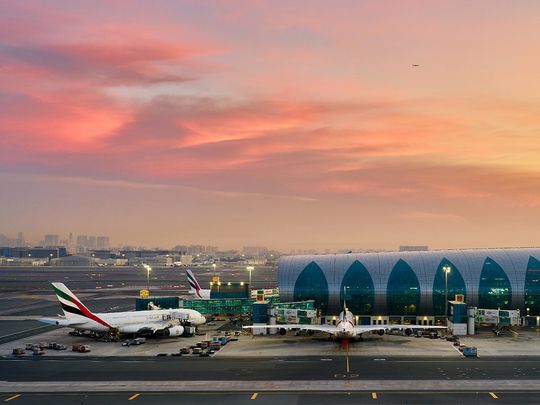A recent report highlights the aviation sector’s crucial impact on Dubai’s economy, showing it supported 27% of the emirate’s GDP in 2023. This translates to an economic contribution of AED 137 billion (USD 37.3 billion), projected to rise to nearly a third of Dubai’s GDP by 2030. The total economic impact reflects both the sector’s core activities and the wider effects of aviation-driven tourism.
In 2023, the aviation sector supported over 630,000 jobs in Dubai, with expectations of an additional 185,000 jobs by 2030. The tourism sector, fueled by aviation, contributed AED 43 billion (USD 11.8 billion) to the local economy last year, with anticipated GDP contributions expected to grow by over 40% by 2030.
Emirates Group and Dubai Airports have published an economic impact study that reaffirms aviation’s pivotal role in the local economy by quantifying its contributions and forecasting future growth based on financial and passenger expansion projections. The study, conducted by global research firm Oxford Economics, assesses direct economic activities from the aviation sector, indirect effects from its supply chain, and induced activities driven by wage-funded consumption from the local aviation workforce. It also evaluates the tourism spending that aviation facilitates in Dubai.
His Highness Sheikh Ahmed bin Saeed Al Maktoum, Chairman and Chief Executive of Emirates Airline & Group, and Chairman of Dubai Airports, stated: “Under the leadership of HH Sheikh Mohammed bin Rashid Al Maktoum, Dubai’s aviation sector has been a core pillar of our city’s economic growth strategy to date, and it will continue to play a key role in the D33 Economic Agenda.
“Supported by strong air connectivity, Dubai has a prominent presence on the global stage for trade, investments, tourism, and is a leading player in aviation and logistics. Our ambitious plans for Dubai World Central – Al Maktoum International Airport, and our ongoing investments to expand capacity at Dubai International, will unlock further economic opportunities by supporting the projected demand for air transport. Our growth plans will generate even more skilled jobs and also help drive innovation as we work with leading technology partners to develop future solutions to enhance travel experiences and make operations more efficient and secure.”
Contribution of the Aviation Sector to Dubai’s Economy
In 2023, Dubai’s aviation sector, including Emirates Group, Dubai Airports (which comprises Dubai International and Dubai World Central – Al Maktoum airports), and other aviation entities, contributed an estimated AED 137 billion (USD 37.3 billion) in gross value added (GVA), accounting for 27% of Dubai’s GDP. This total included a core economic impact of AED 94 billion and AED 43 billion from the tourism facilitated by aviation. These contributions are expected to increase, with projections indicating that aviation activities supported by Emirates and Dubai Airports will generate AED 196 billion, or 32% of Dubai’s projected GDP by 2030 (in 2023 prices).
Aviation-related activities also represented 631,000 jobs across Dubai, equating to one in five jobs in the emirate in 2023. Another 185,000 aviation-related jobs are anticipated to emerge by 2030, raising the total jobs supported by Dubai’s aviation sector to 816,000.
A previous report by Oxford Economics from 2014 indicated that the aviation sector contributed 27% of Dubai’s GDP and supported 417,000 jobs. Although the percentage of GDP attributed to aviation has remained stable, the gross value added has seen real growth, reflecting a faster expansion in other sectors and increased diversification in the economy over the last decade.
Dubai’s commitment to securing its aviation sector’s future as an economic engine is evident through ongoing major investments aimed at expanding operations at Dubai International and developing a new generation facility at Dubai World Central – Al Maktoum International. The new AED 128 billion airport will be five times the size of Dubai International, with the first phase set for completion in 10 years. When fully operational, Dubai World Central – Al Maktoum International will feature over 400 aircraft stands, accommodating 260 million passengers annually. Although the airport’s expansion is not included in the main impact study results, it is expected to contribute approximately AED 6.1 billion to Dubai’s GDP in 2030 and support 132,000 jobs.
The new airport and its surrounding infrastructure will bolster Dubai’s Economic Agenda (D33), which aims to enhance the emirate’s trade and tourism footprint. The D33 initiative also seeks to establish Dubai as one of the most connected cities, adding 400 destinations to its foreign trade map and positioning it among the world’s top five logistics hubs.
Aviation’s Role in Boosting Tourism in Dubai
Aviation serves as a key driver behind the surge of international tourism to Dubai. As one of the world’s most visited destinations, tourists stayed an average of 3.8 nights in 2023, spending around AED 4,300 on accommodations, dining, attractions, and shopping. The report indicates that international visitors to Dubai contributed approximately AED 66 billion in spending last year.
Overall, tourism supported by aviation is estimated to have contributed AED 43 billion in gross value added, representing 8.5% of Dubai’s GDP and supporting 329,000 jobs. Over half of this GVA, totaling AED 23 billion, was generated by travelers arriving in Dubai via Emirates. Looking ahead, tourism in Dubai is expected to grow significantly over the next six years, with aviation-driven tourism spending forecasted to support AED 63 billion in gross value added, equating to 10% of Dubai’s projected GDP and one in eight jobs in the emirate.




